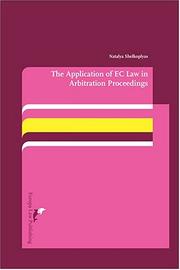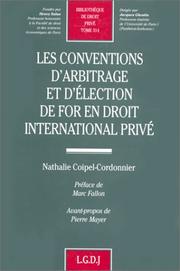| Listing 1 - 10 of 23 | << page >> |
Sort by
|
Book
ISBN: 2247003672 9782247003679 Year: 1983 Publisher: Paris: Dalloz,
Abstract | Keywords | Export | Availability | Bookmark
 Loading...
Loading...Choose an application
- Reference Manager
- EndNote
- RefWorks (Direct export to RefWorks)
Arbitration and award --- Conflict of laws --- Arbitration and award, International --- Arbitrage, --- Arbitrage (Droit) --- Arbitrage (Droit international privé) --- Arbitration and award - France --- Conflict of laws - Arbitration and award - France --- Conflict of laws - Arbitration and award
Book
ISBN: 2711003418 9782711003419 Year: 2004 Publisher: Paris : Litec,
Abstract | Keywords | Export | Availability | Bookmark
 Loading...
Loading...Choose an application
- Reference Manager
- EndNote
- RefWorks (Direct export to RefWorks)

ISBN: 9076871167 9789076871165 Year: 2003 Publisher: Groningen: Europa law publishing,
Abstract | Keywords | Export | Availability | Bookmark
 Loading...
Loading...Choose an application
- Reference Manager
- EndNote
- RefWorks (Direct export to RefWorks)
Book
ISBN: 224704378X 9782247043781 Year: 2001 Volume: 10 Publisher: Paris: Dalloz,
Abstract | Keywords | Export | Availability | Bookmark
 Loading...
Loading...Choose an application
- Reference Manager
- EndNote
- RefWorks (Direct export to RefWorks)
Book
ISBN: 9789004171480 9004171487 9047424808 9789047424802 Year: 2008 Publisher: Leiden Boston : Martinus Nijhoff,
Abstract | Keywords | Export | Availability | Bookmark
 Loading...
Loading...Choose an application
- Reference Manager
- EndNote
- RefWorks (Direct export to RefWorks)
Also available as an e-book Le droit de l’arbitrage, plus encore que le droit international privé, se prête à une réflexion de philosophie du droit. Les notions, essentiellement philosophiques, de volonté et de liberté sont au coeur de la matière. La liberté des parties de préférer aux juridictions étatiques une forme privée de règlement des différends, de choisir leur juge, de forger la procédure qui leur paraît la plus appropriée, de déterminer les règles de droit applicables au différend, quitte à ce qu’il s’agisse de normes autres que celles d’un système juridique donné, la liberté des arbitres de se prononcer sur leur propre compétence, de fixer le déroulement de la procédure et, dans le silence des parties, de choisir les normes applicables au fond du litige, soulèvent autant de questions de légitimité. Le présent ouvrage s’attache à identifier les postulats philosophiques qui sous-tendent la matière, à montrer leur profonde cohérence et les conséquences pratiques qui en découlent dans la résolution des grands contentieux du commerce international.
Arbitration (International law) --- Arbitrage international --- Arbitration and award, International --- Conflict of laws --- Philosophy --- Arbitration and award --- Arbitration and award, International -- Philosophy. --- Conflict of laws -- Arbitration and award -- Philosophy. --- International commercial arbitration --- Law, Politics & Government --- Law, General & Comparative --- Choice of law --- Intermunicipal law --- International law, Private --- International private law --- Private international law --- Law --- Legal polycentricity --- Commercial arbitration, International --- International arbitration and award --- Arbitration and award&delete& --- Civil law --- Law and legislation --- Philosophy. --- Arbitration and award, International - Philosophy --- Conflict of laws - Arbitration and award - Philosophy --- Arbitrage (droit international privé) --- Droit --- Droit international économique --- Droit commercial (droit international) --- Philosophie --- Sources

ISBN: 2275018034 9782275018034 Year: 1999 Volume: 314 Publisher: Paris: Librairie générale de droit et de jurisprudence,
Abstract | Keywords | Export | Availability | Bookmark
 Loading...
Loading...Choose an application
- Reference Manager
- EndNote
- RefWorks (Direct export to RefWorks)
A la différence des comparaisons entre les conventions d'arbitrage et d'élection de for habituellement faites, l'étude aborde ces clauses dans une optique plus prospective que descriptive, pour dégager de leur confrontation des principes qui leur sont communs, susceptibles de stimuler, voire de bouleverser, la réflexion relative à chacune d'elles. Pour être féconde, cette démarche doit s'appuyer sur les ressemblances entre les conventions d'arbitrage et d'élection de for. Aussi ces dernières sont-elles étudiées dans le cadre du droit international privé. En cette matière, en effet, les questions qu'elles suscitent pour le juge étatique qui les examine sont semblables. La recherche s'enrichit, par ailleurs, du rapprochement entre les solutions données à ces problèmes en France, en Belgique et en Allemagne. La première partie de l'ouvrage est consacrée à l'examen du statut des conventions d'arbitrage et d'élection de for en droit international privé. Il apparaît que ces clauses présentent la spécificité par rapport aux contrats substantiels de ne pas seulement être soumises au conflit de lois, mais de se rattacher également à la matière des "conflits de juridictions". L'hypothèse de ce "double rattachement" est systématisée dans ses conséquences théoriques sur les droits applicables aux conventions de juridiction et sur leur régime dans le cadre d'une situation internationale ou lors de la reconnaissance d'une décision, sentence ou jugement. Cette analyse fournit une explication originale pour la jurisprudence française relative à la convention d'arbitrage, tout en invitant à explorer des voies nouvelles pour la réflexion sur des questions particulières que soulèvent les deux clauses (par exemple, à propos de leurs liens avec la Convention de Bruxelles du 27 septembre 1968). La seconde partie de l'ouvrage met en œuvre, complète et nuance les principes exposés, en les confrontant à quelques problèmes particuliers. Le canevas conceptuel et théorique dégagé permet ainsi d'aborder de manière nouvelle la question de l'"arbitrabilité" et celles qui concernent le droit applicable à la formation des conventions de juridiction, plus particulièrement à leur forme.
Law of civil procedure --- International private law --- International commercial arbitration --- Conflict of laws --- Arbitrage commercial international --- Juridiction (Droit international privé) --- Jurisdiction --- Arbitration and award. --- AA / International- internationaal --- 341.5 --- V31 - Droit international privé - Internationaal privaatrecht --- INTERNATIONAAL PRIVAATRECHT V 31 --- Internationaal privaatrecht. --- Juridiction (Droit international privé) --- Arbitration and award --- Internationaal privaatrecht --- Conflict of laws - Arbitration and award. --- Clause compromissoire --- Clause attributive de juridiction
Book
ISBN: 2802720740 9782802720744 Year: 2005 Publisher: Bruxelles: Bruylant,
Abstract | Keywords | Export | Availability | Bookmark
 Loading...
Loading...Choose an application
- Reference Manager
- EndNote
- RefWorks (Direct export to RefWorks)
Law of civil procedure --- International private law --- Conflict of laws --- Arbitrage (Droit international privé) --- Ordre public (Droit international privé) --- Arbitration and award --- Public policy --- Arbitrage (Droit international privé) --- Ordre public (Droit international privé) --- Conflict of laws - Arbitration and award --- Conflict of laws - Public policy
Book
ISBN: 2802720783 371902394X 9783719023942 9782802720782 Year: 2005 Publisher: Bruxelles: Bruylant,
Abstract | Keywords | Export | Availability | Bookmark
 Loading...
Loading...Choose an application
- Reference Manager
- EndNote
- RefWorks (Direct export to RefWorks)
Sports --- Arbitration and award. --- Conflict of laws --- Law and legislation. --- Sports officiating --- Arbitrage (Sports) --- Arbitrage (Droit international privé) --- Law and legislation --- Arbitration and award --- Droit --- Court of Arbitration for Sport --- Sports - Law and legislation. --- Conflict of laws - Arbitration and award. --- Acqui 2006
Book
ISBN: 9783866531703 3866531702 9783866539297 3866539290 1283014556 9786613014559 Year: 2011 Publisher: Munich : Sellier,
Abstract | Keywords | Export | Availability | Bookmark
 Loading...
Loading...Choose an application
- Reference Manager
- EndNote
- RefWorks (Direct export to RefWorks)
Irrespective of the increasing harmonization of law at the transnational level, every arbitration raises a number of conflict of laws problems relating to procedural questions as well as to issues concerning the merits of the case. Unlike a state court judge, the arbitrator has no "lex fori" in the proper sense providing the relevant conflict rules to determine the applicable law. This raises the question of what conflict of laws rules to apply and, consequently, of the extent of the freedom the arbitrator enjoys in dealing with this and related issues. The best example of the importance of conflict of laws questions in arbitration is the Vivendi-Elektrim saga where the outcome of the various proceedings depended on the question of characterization.This very beneficial book is dealing with- the arbitration agreement,- the jurisdiction of the arbitral tribunal,- the law applicable to the merits and- the arbitration procedure.
Arbitration and award, International --- Conflict of laws --- Congresses --- Arbitration and award --- International commercial arbitration --- Choice of law --- Intermunicipal law --- International law, Private --- International private law --- Private international law --- Law --- Legal polycentricity --- Civil law --- Arbitration and award, International - Congresses --- Conflict of laws - Arbitration and award - Congresses
Book
ISBN: 9004388915 9789004388918 9789004388925 9004388923 Year: 2018 Publisher: Leiden Brill Nijhoff
Abstract | Keywords | Export | Availability | Bookmark
 Loading...
Loading...Choose an application
- Reference Manager
- EndNote
- RefWorks (Direct export to RefWorks)
The ultimate question that runs through all of our law of arbitration is the allocation of responsibility between state courts and arbitral tribunals : If private tribunals assume the power to bind others in a definitive fashion, we must ask, where does this authority come from ? Fundamentally different in this respect from a state judge, a private arbitrator may only derive his legitimacy from that exercise of private ordering and self-government which characterizes any voluntary commercial transaction. This work begins then with the dimensions of that “consent” which alone can justify arbitral jurisdiction. The discussion is then carried forward to explore how party autonomy in the contracting process may be expanded, giving rise to the voluntary reallocation of authority between courts and arbitrators. It concludes with the necessary inquiry into the autonomy with respect to the “chosen law” that will govern the agreement to arbitrate itself.
International commercial arbitration. --- Arbitrage commercial international --- Conflict of laws --- Arbitrage (Droit international privé) --- State courts --- Cours d'État --- International and municipal law --- Droit international et droit interne. --- Rule of law --- Règle de droit --- Arbitration and award. --- Arbitration and award, International --- Commercial arbitration, International --- International arbitration and award --- International commercial arbitration --- Arbitration and award --- Law and legislation --- Conflict of laws - Arbitration and award
| Listing 1 - 10 of 23 | << page >> |
Sort by
|

 Search
Search Feedback
Feedback About UniCat
About UniCat  Help
Help News
News